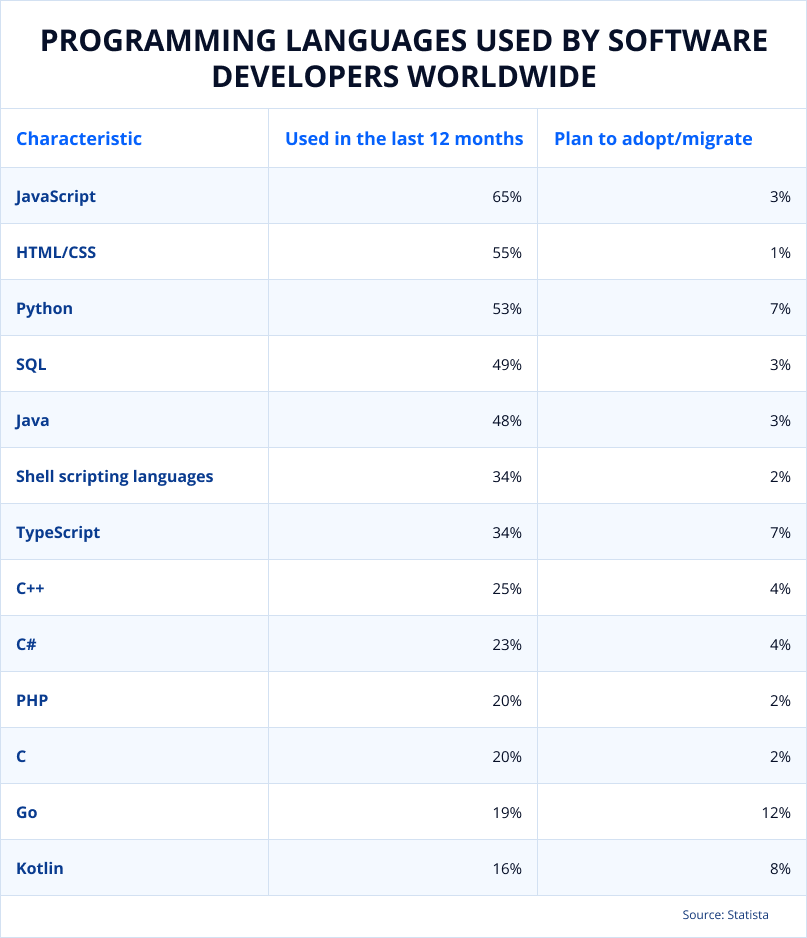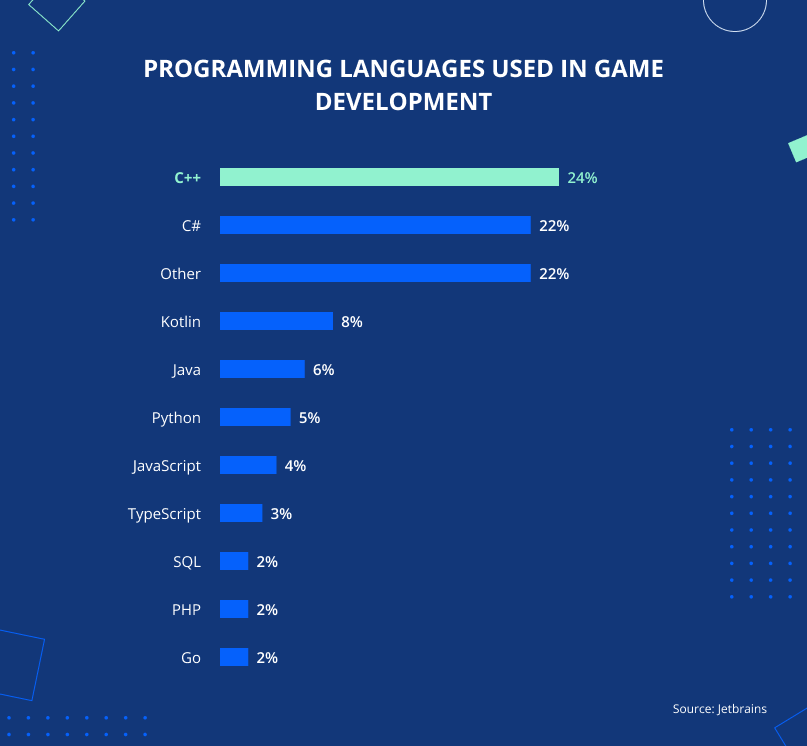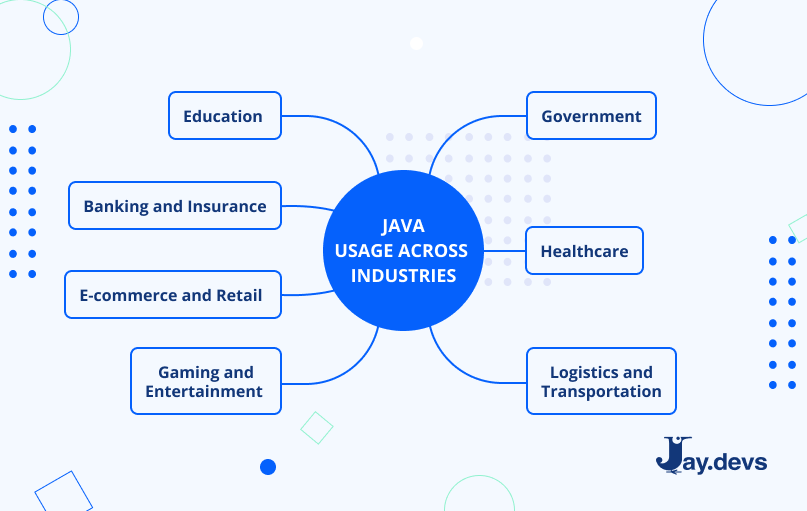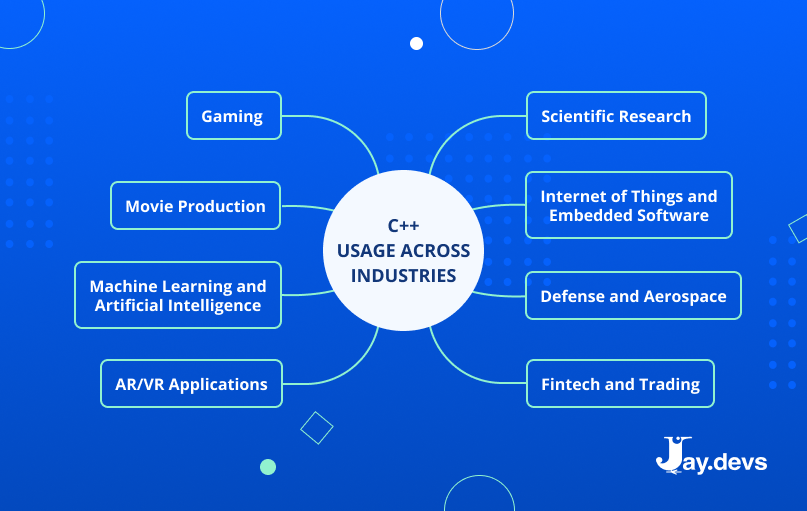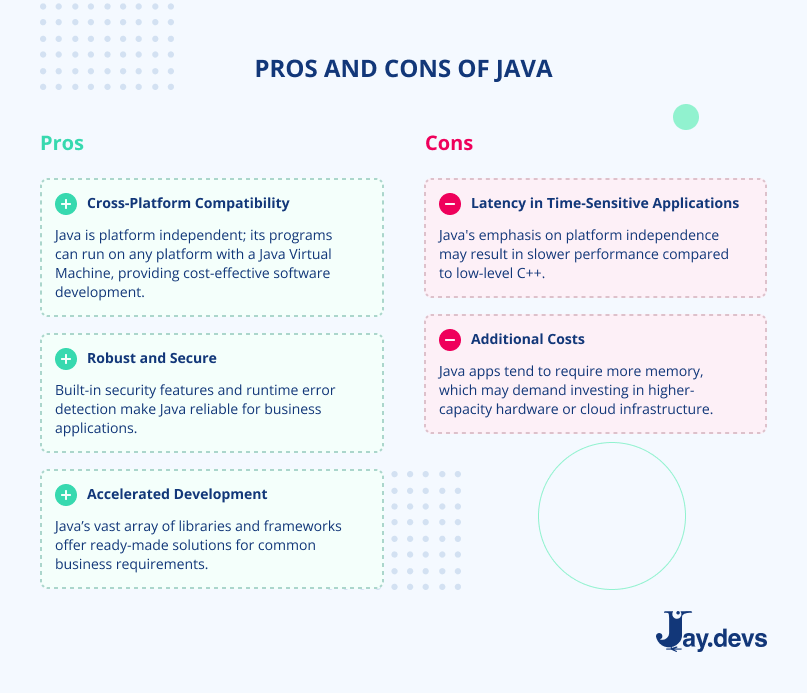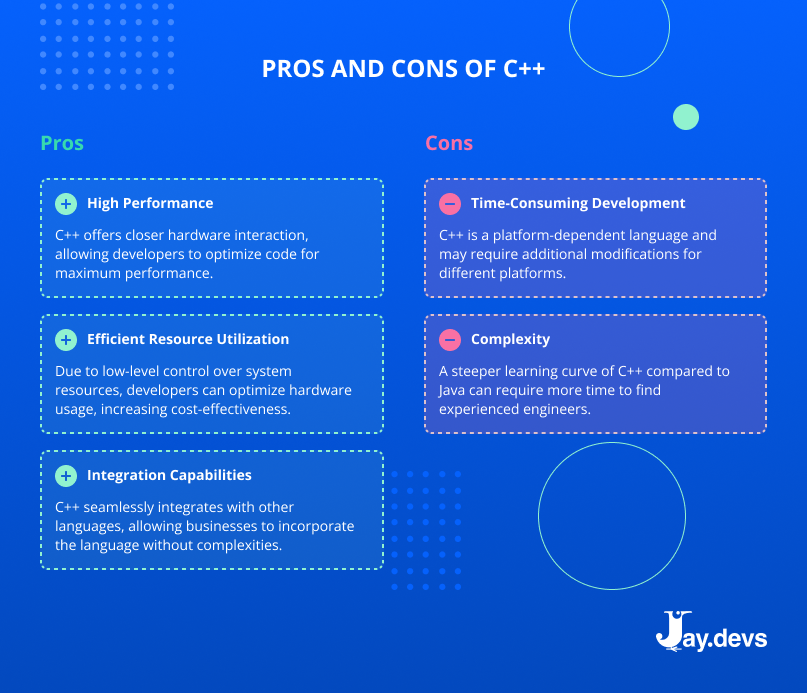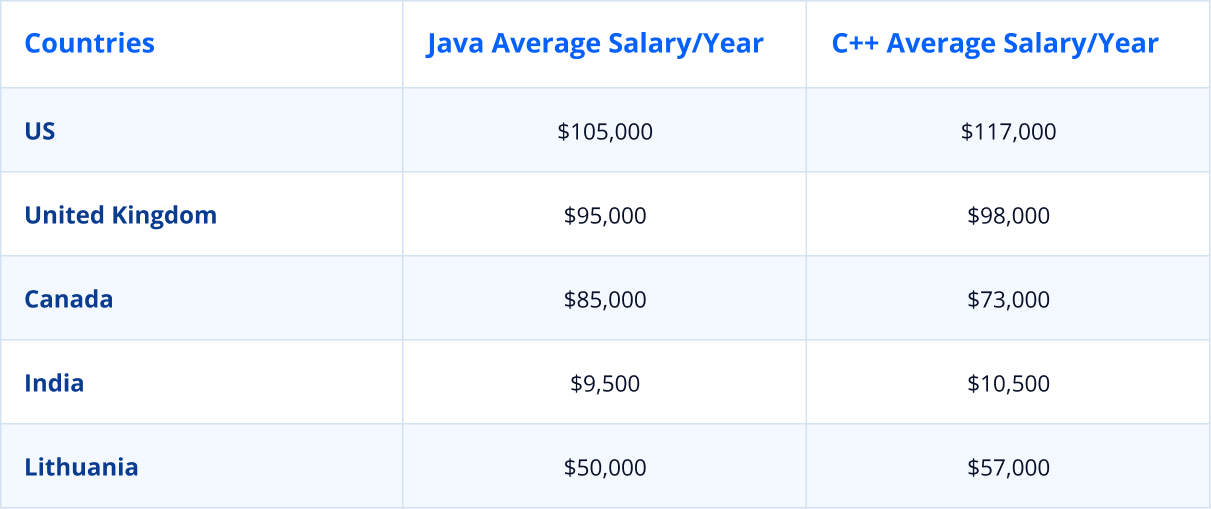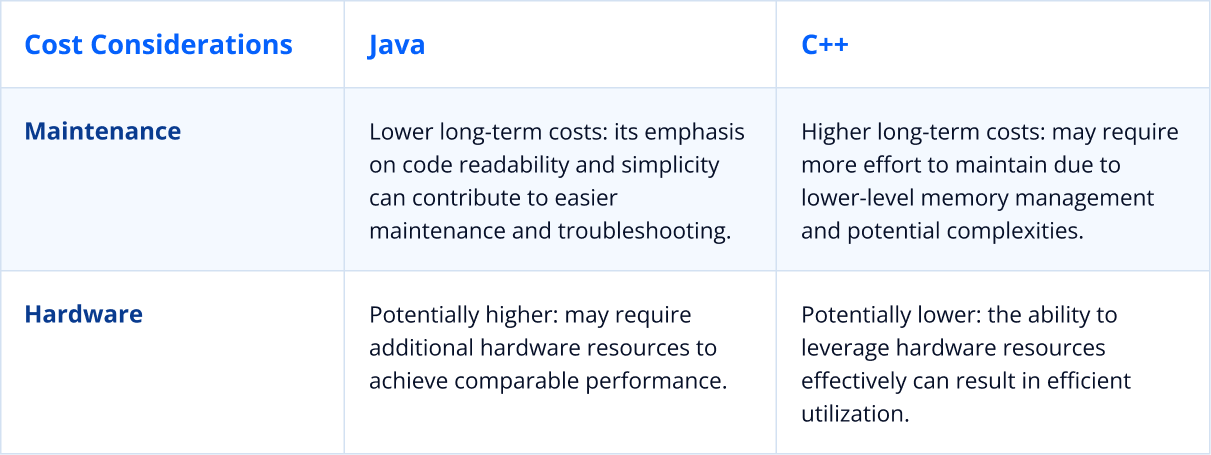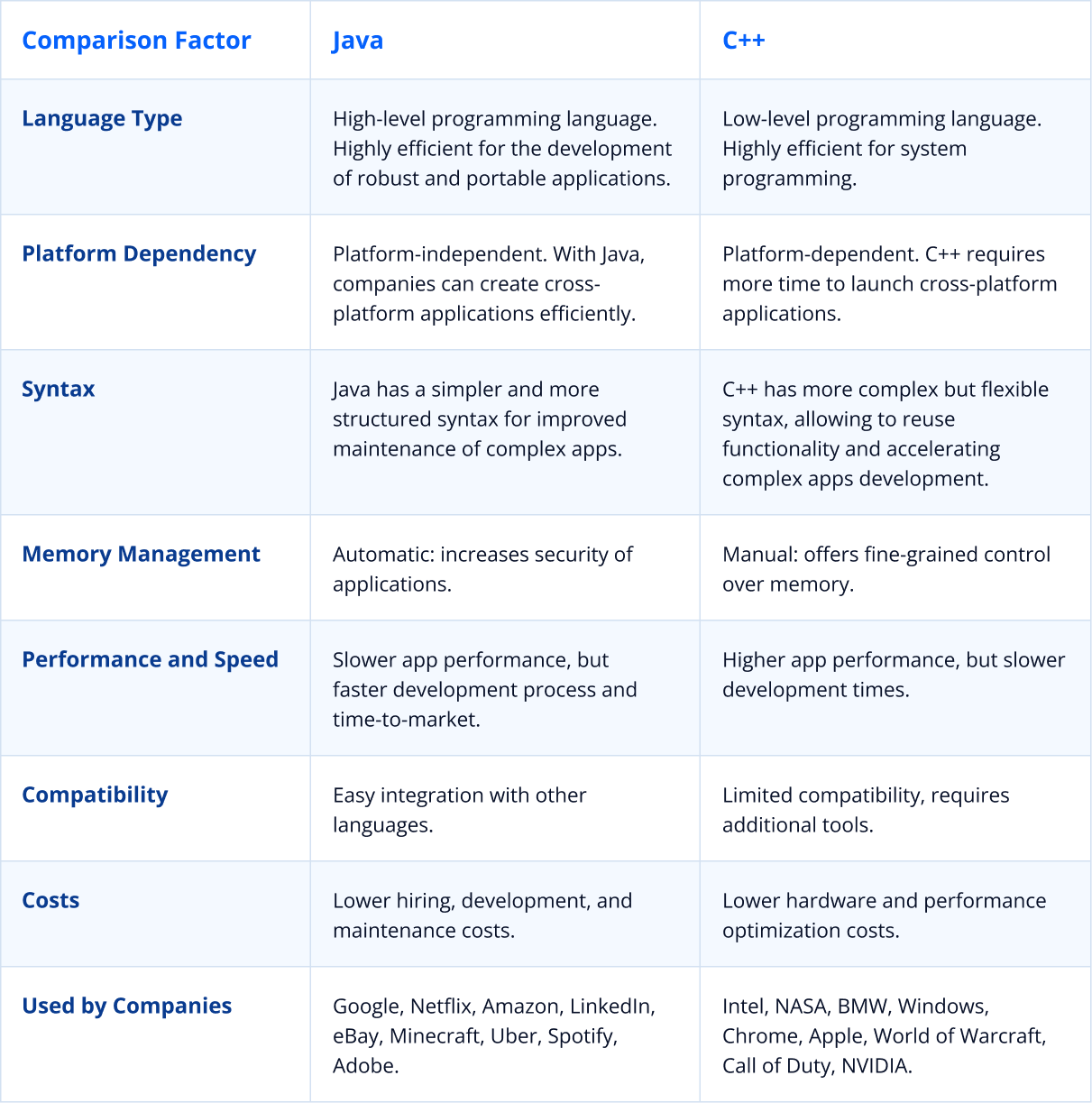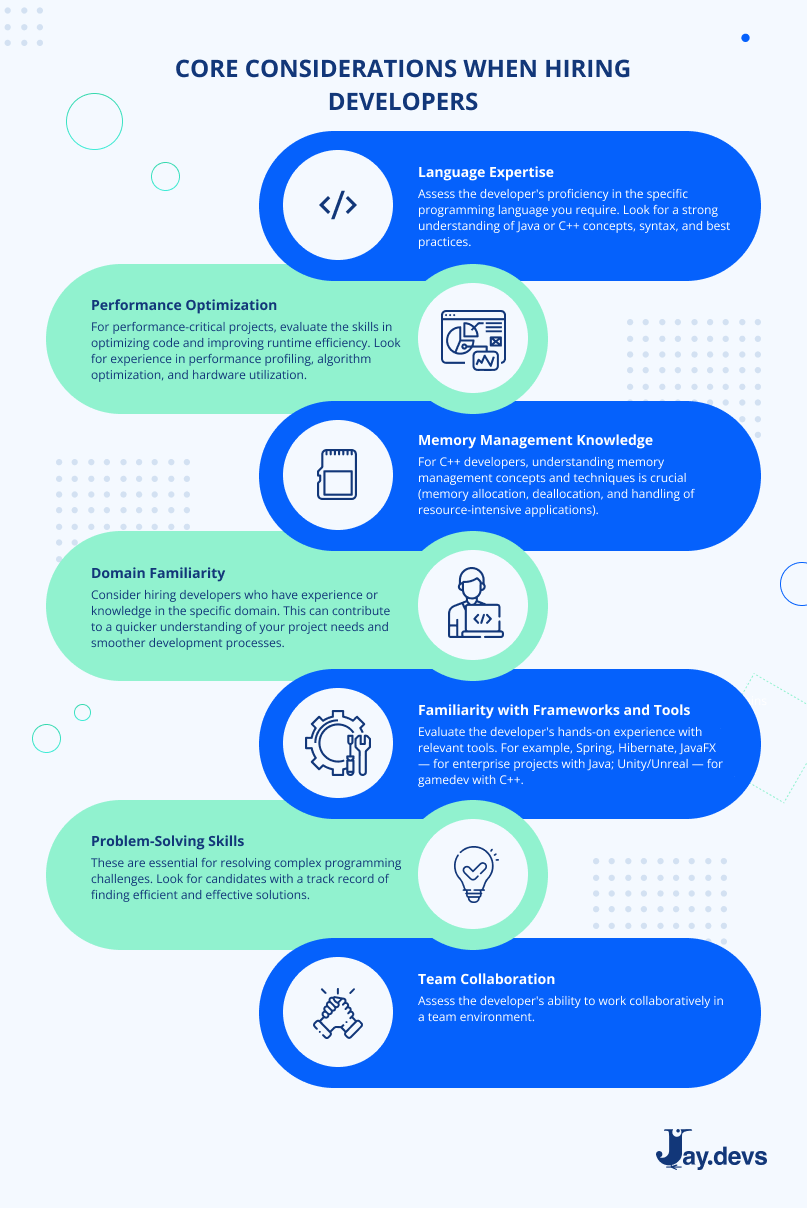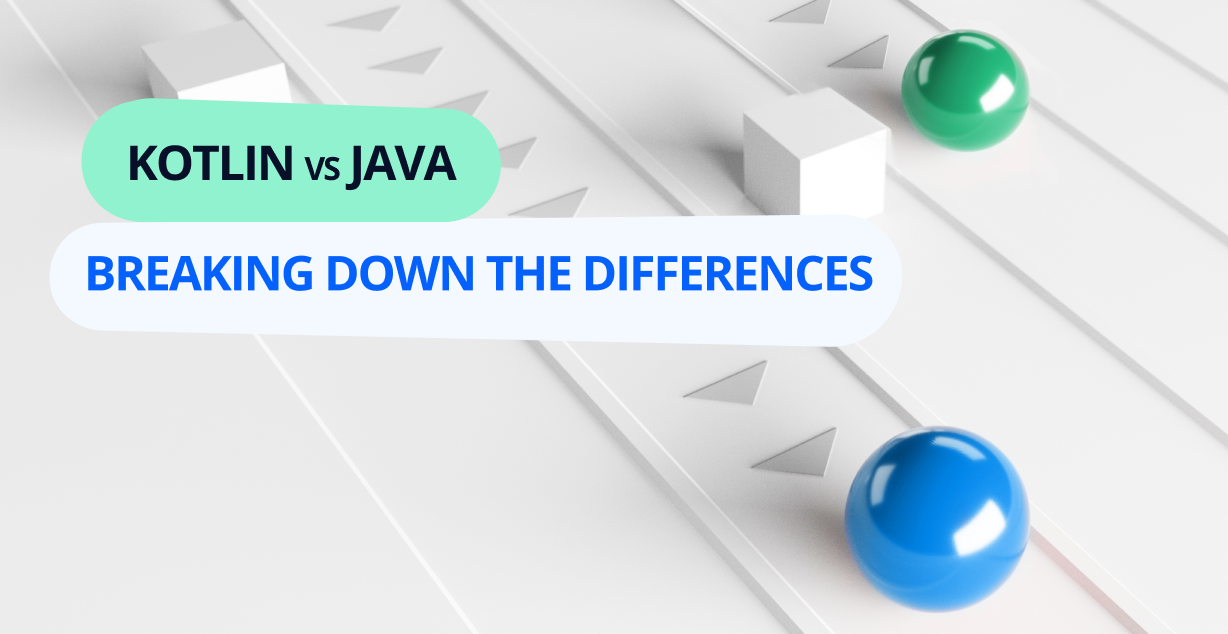C++ and Java are among the earliest technologies that have been instrumental in developing large-scale applications, games, and more. According to statistics, both technologies are among the most popular programming languages globally.
In today’s fast-paced environment, companies should be assured their solutions will be feature-loaded, easily scalable, and maintainable to ensure business value and benefit.
Accordingly, in this article, we will consider the differences between Java and C++, so you can align them with your project requirements and choose the more appropriate programming language for your case.
What is C++?
C++ is a general-purpose, object-oriented programming language that originated as an extension of the C language.
First released in 1985, C++ introduced OOP concepts based on organizing the code into classes and objects. This paradigm enables technicians to write well-structured and reusable code, making complex programs easier to understand, maintain, and extend.
C++ programming language was also a solution to replace languages that were “too slow for practical use.” It gives developers more control over system resources, allowing them to create highly performant solutions.
What is Java?
Java is a versatile object-oriented language known for its simplicity, platform independence, and extensive ecosystem of libraries and frameworks.
Originally released in 1995, Java gained popularity for its “Write once, run anywhere” principle, meaning compiled Java code can run on any operating system. This feature made Java a popular choice for cross-platform development.
Java was also designed to strongly emphasize security, thereby providing a safe basis for enterprise-level apps.
What Is Java Used For?
Java finds extensive use in various business projects offering versatility and robustness. Let’s look at notable use cases where this technology excels.
Web Development with Java
Java language is geared towards building intricate applications operating across web browsers. Java offers robust tools that make web development efficient and scalable. For example, Spring framework, Drools, and Hadoop tools are used to process data and handle complex logic behind web apps.
Furthermore, Java is extensively used for eCommerce solutions, social media apps, blogs, and news websites.
Notable successful projects utilizing Java for web development include LinkedIn, Amazon, and eBay.
Mobile Development with Java
Java programming language is fundamental for building Android applications. Android Studio provides built-in support for Java, allowing developers to create native mobile applications that are engaging and high performing.
The Play Store has a diverse range of Java-based applications, including games, banking, and streaming apps. For instance, Minecraft, Uber, and Spotify are built with Java.
Desktop Application Development with Java
Java is platform-independent and lets developers build one application that will run on Windows, macOS, and Linux systems without extensive modifications.
Java libraries such as Java Swing and JavaFX are prominent tools for building graphical user interfaces (GUI). They power desktop apps like Acrobat Reader, Media Player, and others.
What Is C++ Used For?
C++ is renowned for its performance and efficiency. To define to what extent use cases of Java and C++ are similar, let’s explore key areas where C++ outshines.
Systems Programming with C++
System programming involves creating software that enables computers to perform specific tasks, like operating systems or device drivers.
C++ is a top choice for this task, offering native system libraries for quick programming of system-related functionalities.
Most operating systems rely on C++, including Windows and MacOS, and browsers like Chrome and Mozilla.
Game Development with C++
C++ is a popular option for games due to access to hardware and compatibility with gaming engines like Unity and Unreal.
It allows developers to create stellar and immersive games with precise control over graphics rendering, audio processing, and game logic.
Renowned game titles such as World of Warcraft, Call of Duty, and Counter-Strike have been developed using C++.
High-Performance Computing with C++
The effective usage of hardware is the specific difference between Java and C++. C++ excels in heavy computing, enabling faster execution and efficient utilization of system resources.
For example, when comparing Java vs C++ for AI solutions, the latter is often favored for training large-scale neural networks and processing massive datasets. For instance, companies like Apple and NVIDIA leverage C++ for AI-related development.
Companies Using Java for Their Projects
Considering Java vs C++ for app development, the former enjoys widespread adoption across the following industries:
Java is favored by many prominent companies, including:
- Google: The corporation greatly benefits from Java platform independence, using this programming language for Android, web applications, and backend systems.
- Netflix: Java is the primary technology for Netflix, initially chosen for building scalable and resilient backend systems that power Netflix’s streaming platform.
- Amazon: Java tools ecosystem, robustness, and scalability help develop critical components of the e-commerce platform, cloud services, and backend infrastructure.
Companies Using C++ for Their Projects
C++ is widely employed in performance-critical domains, namely:
When comparing Java vs C++ applications, the globally famous projects favoring C++ include:
- Intel: C++ plays a significant role in developing system software, drivers, compilers, and performance optimization tools for Intel processors.
- NASA: C++ is used by NASA for developing software and systems used in space exploration missions, satellite operations, and scientific data analysis.
- BMW: The language is utilized for developing embedded systems, automotive software, and vehicle control systems that require real-time performance and high reliability.
What Are the Pros and Cons of Java and C++?
To answer the question is C++ better than Java or vice versa, let’s consider their advantages and disadvantages for business projects:
Pros of Java:
- Cross-Platform Compatibility: Java is platform independent; its programs can run on any platform with a Java Virtual Machine, providing cost-effective software development.
- Robust and Secure: Built-in security features and runtime error detection make Java reliable for business applications.
- Accelerated Development: Java’s vast array of libraries and frameworks offer ready-made solutions for common business requirements.
Cons of Java:
- Latency in Time-Sensitive Applications: Java’s emphasis on platform independence may result in slower performance compared to low-level C++.
- Additional Costs: Java apps tend to require more memory, which may demand investing in higher-capacity hardware or cloud infrastructure.
Pros of C++:
- High Performance: C++ offers closer hardware interaction, allowing developers to optimize code for maximum performance.
- Efficient Resource Utilization: Due to low-level control over system resources, developers can optimize hardware usage, increasing cost-effectiveness.
- Integration Capabilities: C++ seamlessly integrates with other languages, allowing businesses to incorporate the language without complexities.
Cons of C++:
- Time-consuming development: C++ is a platform-dependent language and may require additional modifications for different platforms.
- Complexity: A steeper learning curve of C++ compared to Java can require more time to find experienced engineers.
Differences Between C++ and Java
Like Java, C++ is leveraged in multiple projects, which may be confusing. To assist you in decision-making, let’s contrast the core differences between Java and C++.
Syntax Differences Between C++ and Java
Both technologies are object-oriented programming languages, so the structure of Java vs C++ code is quite similar. However, there are specific differences in syntax that can impact business projects.
C++ offers multiple inheritances, where a child class inherits attributes and behaviors from multiple parent classes. This empowers businesses to reuse and combine functionalities efficiently, benefiting projects like game development and scientific computing.
In contrast, Java doesn’t support multiple inheritance and focuses on more structured, less error-prone code. Such an approach simplifies maintenance and enhances the reliability of enterprise-grade systems.
Memory Management Difference Between C++ and Java
The main ways to control memory are manual and automatic memory management, each offering distinct advantages.
C++ offers manual memory management. Such an approach helps to achieve optimized performance and resource utilization in applications like financial modeling or video rendering software.
Java’s dynamic memory allocation simplifies development and improves productivity. Java’s automatic garbage collection minimizes the risk of memory leaks, which is especially important for banking or government solutions.
Performance and Speed Difference
Regarding C++ vs Java performance, there are underlying peculiarities to consider.
C++ is compiled directly into machine code before execution, contributing to high runtime performance. This makes C++ popular for applications where each millisecond matters (games, trading apps).
Java source code is first compiled into a bytecode and then translated into machine code by a Java Virtual Machine. Comparing the C++ vs Java speed, the latter may show lower app performance due to this multi-step process. However, Java offers faster development times.
Compatibility with Other Programming Languages
C++ allows easy integration with other popular programming languages, including Java. It is a helping hand for projects requiring interoperability with existing codebases or libraries.
Java has limited compatibility, requiring Java Native Interface to interact with other languages, leading to more time-consuming integration processes.
Cost Considerations for C++ and Java Projects
As mentioned above, C++ has a steeper learning curve requiring more specialized skills. This affects the developers’ salaries, thereby increasing development expenses.
Is Java easier than C++ to grasp? Generally, yes. It leads to a larger pool of developers, which is reflected in lower salaries and potentially reduced development costs.
To plan a budget for your project, you can rely on this comparison of Java vs C++ salaries for developers:
When comparing Java vs C++ for software development, there are other important cost aspects to foresee:
Let’s wrap up the difference between the two languages based on the discussed aspects:
When Should You Use C++ vs. Java?
To pick a better programming language, consider the following scenarios:
When to Use C++
- Systems programming
- OS development
- Game development
- ML and AI apps
- Performance-critical applications
- Projects requiring direct hardware access or extensive control over memory management
When to Use Java
- Web development
- Enterprise-scale applications
- GUI Desktop Apps
- Cross-platform applications
- Android app development
Key Considerations When Hiring Developers
When evaluating Java developers and C++ engineers for your project, assess the following qualities:
Tailor your hiring considerations to your specific project requirements and company culture. Assessing these key factors will help you find the right software developer for your team.
Final Thoughts and Recommendations
Choosing between Java or C++ for your project requires careful consideration of requirements and objectives.
Java’s versatility and extensive ecosystem make it an excellent choice for enterprise-level web apps, Android, and cross-platform desktop applications.
Conversely, if your project is about native desktop application development, IoT, game, or system development, C++ is the preferred option.
If you are about to start your enterprise-grade project, you’ll most likely require tech professionals to turn it into reality. If you lack such candidates, we offer remote Middle, Senior, and Lead Java developers who’ll integrate into your team seamlessly.
Contact us to get more information, including candidates’ CVs.





